(Please scroll down to view the Chinese version 请向下捲動以查看中文版本)
Lately, I have been wondering what Carrie Bradshaw’s love life would look like if her character existed in our era of AI agents.
Carrie is the heroine of Sex and the City, which has recently returned to Netflix's shelves. If you’re watching it for the third time or more, put your hand up! With more life experience, I find SATC is even more relatable than when I watched it in my 20s. SATC has made us think that romantic relationships are more than just for marriage and children.
Of course, the relationship between Carrie and Mr. Big is on the show's center stage. For years, these two lovebirds have invited us to their rollercoaster ride characterized by extreme swings between pain and exhilaration.
While their story is fiction, it’s deeply relatable. Humans have this incredible ability to hurt the ones we love the most. Most of us would not choose to inflict pain on our loved ones deliberately, but again and again, we side with our ego, fear, and societal expectations. As a third person in front of the screen, I see the obvious path to Carrie’s and Mr. Big’s happiness, but if we look at our behaviors honestly, don’t we all make similar mistakes to theirs?

We choose self-sabotage by blocking the passage to our hearts so we can continue to operate based on fear and insecurities. We follow scripts others write because we have not written our own script for far too long. We are afraid of getting out of our old pattern, which is what we are familiar with, even if that means repeated cycles of pain and chaos. To dodge the pain, we numb ourselves with the ever more easily accessible distractions—drugs, alcohol, porn, food, work, and social media.
In SATC, time and time again as their relationship grows closer, Mr. Big puts blocks up between them to keep the distance so he can protect his heart. When Mr. Big returned Carrie’s belongings that she left at his house in a Barney’s shopping bag, our hearts sank. When Mr. Big decided to move to Paris without consulting Carrie, we screamed at him with her. When Mr. Big wed classic socialite Natasha, whom everyone in the Hamptons expected him to marry, we could see how he struggled to make the marriage work. Over the years, Carrie has thrown all kinds of items in Mr. Big’s face. The last straw was the wedding bouquet when Mr. Big stood up Carrie at the altar.

What if someone gives you a pass from this rollercoaster ride? Imagine an agent that takes the heat and chooses the ‘right’ dating partners for you so you can just enjoy candle-lit dinners without fear of rejection or conflict. Even better, what if AI puts together a digital partner that is just perfect for you?
If you want a pain-free romance, your wish may just come true. Bumble, the women-centered dating app, announced an ‘AI concierge’ in May 2024. Bumble claims that the ‘AI concierge’ can do all the profile scanning for you, so you do not need to talk to hundreds of people. But what are we missing when we lose the opportunity to explore what we don’t want, especially when we don’t yet know what we do want?
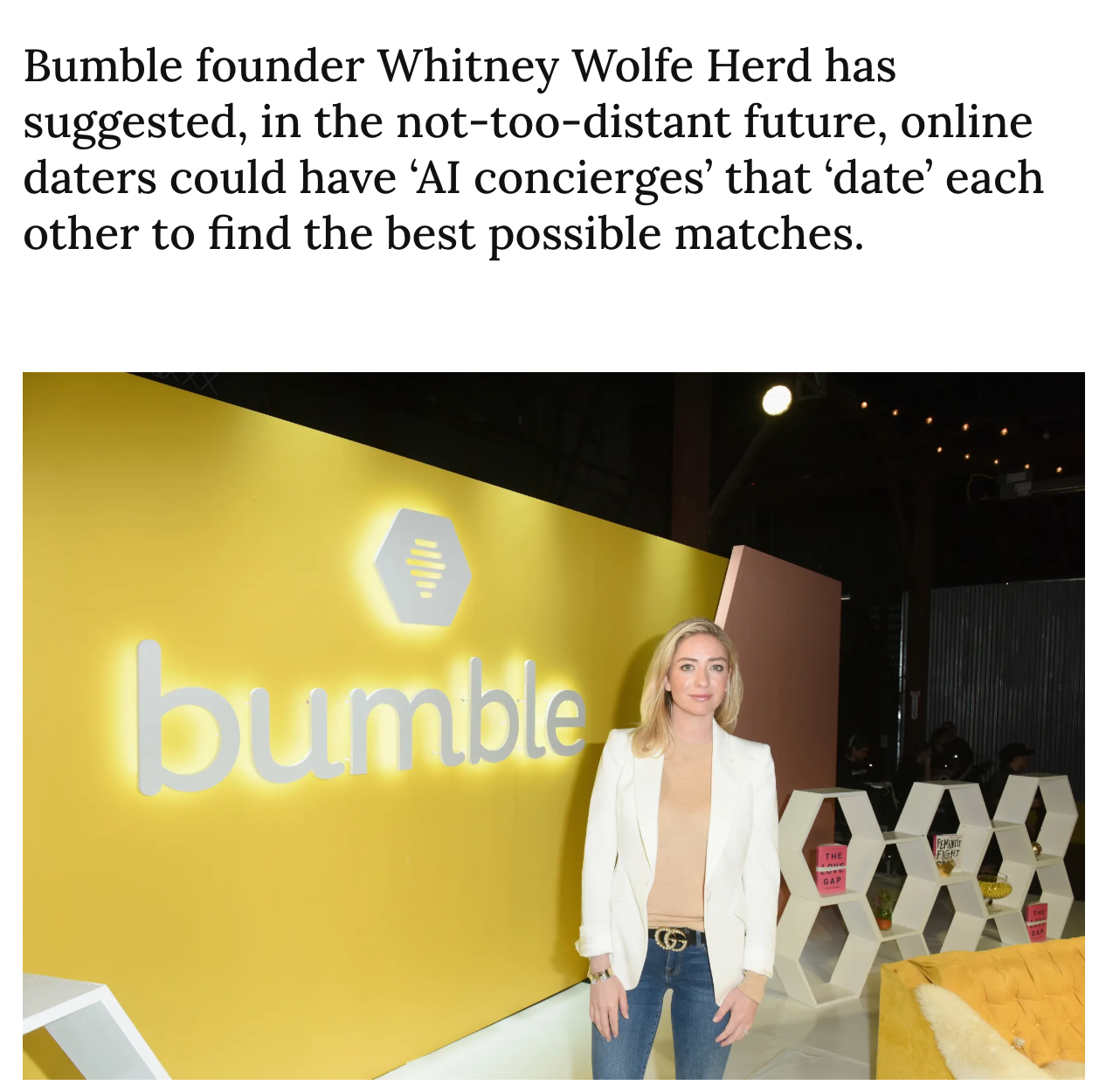
Attempts to use technology to combat loneliness are not exclusive to Western culture or our AI era. Japan has been and remains one of the most unhappy countries on Earth. According to Ipsos’ ‘Global Happiness 2024’ Japan is the third-lowest-ranked country out of the 30 surveyed. Only 57% of Japanese feel happy, which is on a downward trend compared to 70% in 2011. Over the years, Japan has developed some of the most creative solutions to combat loneliness. In the ’90s, Tamagotchi (“egg watch” in Japanese), a brand of handheld digital pets, was launched. The fad spread worldwide. As of 2023, over 90 million have been sold.
Fast-forward to 2024. The Japanese dating app Loverse is one of the latest digital solutions for love, as the name implies. Loverse connects real-life persons to a digital AI personality. This AI “match” can do everything a real-life partner would, including waking you up and chatting about food choices and TV programs. Unlike Carrie and Mr. Big, your relationship with your AI partner is smooth. There shall be no disagreement and no possibility of throwing any wedding bouquet.
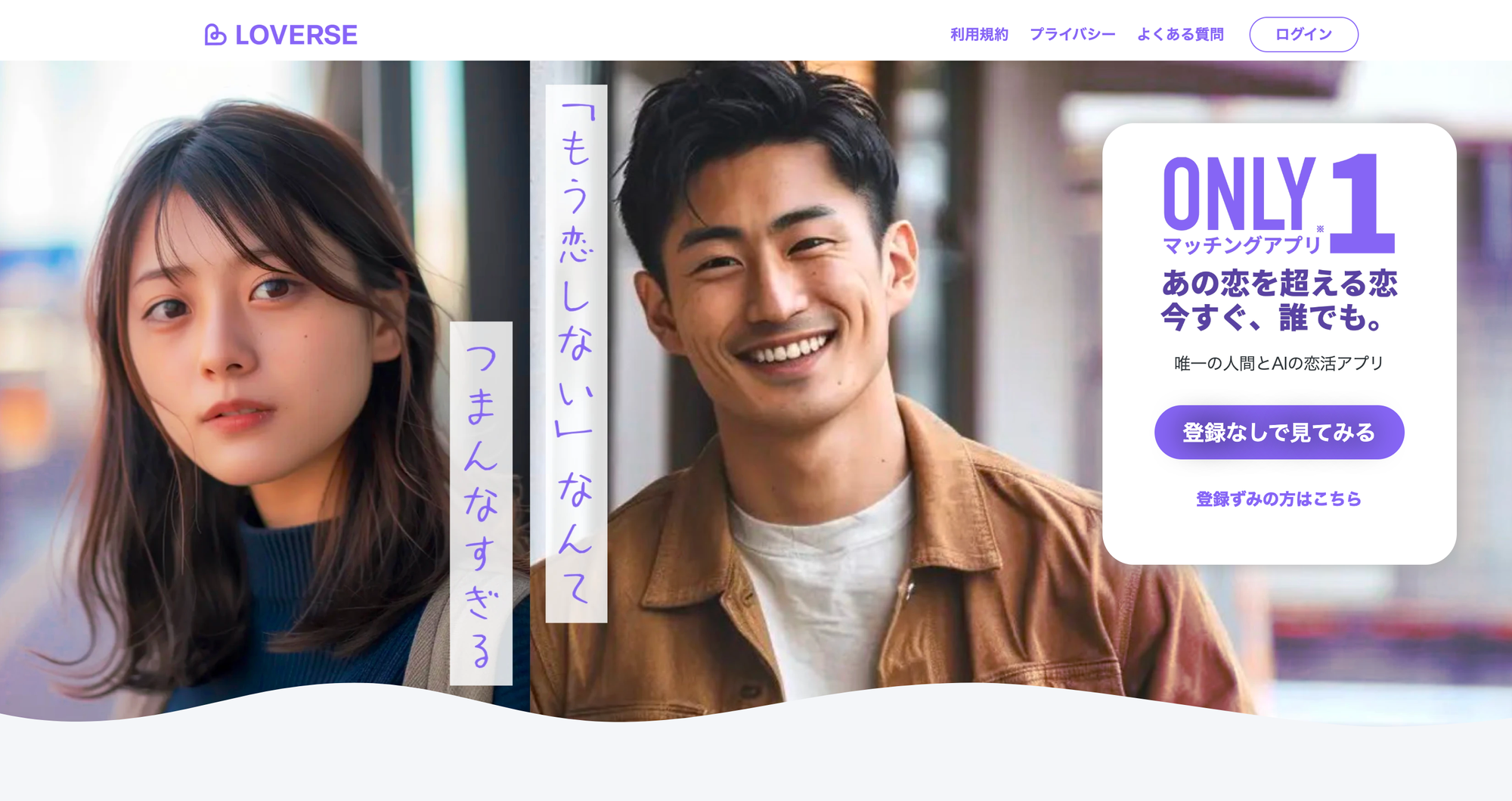
Increasingly, dating is seen as a hazardous, money-wasting activity in Japan. Data from the government show that two-thirds of men in their 20s don’t have a partner, and 40% have never gone on a date. The data for women are better but still problematic. For women, the figures in the same age group are 51% and 25%, respectively.
If you focus only on Carrie and Mr. Big's fights over the years, we may all come to the same conclusion as the young adults in Japan. However, here is the truth. No matter how often we think Carrie and Mr. Big should not get back together, we gasp when we see how they look at each other, their deep connections, and their longing onscreen. We understand why they would give it another try.
Over the years, we see Mr. Big and Carrie grow as individuals and gain clarity about who they are to each other. In the early days, Mr. Big is torn between his head and heart. He can’t accept that the person he loves is not some high-society goddess he can impress his mother with, but a free spirit—no way you can put her in a box as a sex column writer. He worries about getting hurt when he can’t logically see how it could work long-term.
In a headstrong society, how many of us have gone against our hearts and made life decisions based on ego and fear, only to realize our heads rarely triumph over our hearts?
You can ignore your heart, but not forever.
Through all the disagreements, hurt, and pain, we help each other grow and find out who we truly are. We go to places in our hearts that have been unknown to us. Love comes in many forms and evolves over time, as it does over distance. When Carrie told Mr. Big to go to Paris without her, that was love, too. It reminded me of my mother letting me go to boarding school in the U.K. when I was only fourteen. I now realize how much unconditional love is required to set free the ones you want to hold closest to you.
It is precisely this art-imitates-life rollercoaster storyline that has kept us going all these years. We have all been there, and we can all relate.
If AI partners can eliminate all the pain and hurt of dating, the difficult conversations and decisions, how are we supposed to grow and find ourselves, and who do we go on a heart adventure with?
Just because an AI partner is judgment-free does not mean you will not continue to judge yourself, which is one of the most significant risk factors in mental health. All the ups and downs of a relationship are training grounds for building resilience.
We have seen what happens when we swap an outdoor play-based childhood with one that is screen-based. Research in neurodevelopment has proven the damage social media has done to our young adults. Social media establishes an impossible standard for a healthy, happy individual’s life.
Similarly, must we allow screen-based romance to distort our perspective on love? Artificial intimacy can perpetuate loneliness by discouraging users from entering natural human relationships. After all the smooth conversations and compliments from a digital partner, how do you find the courage to ride on the rollercoaster of human romance again?
Must our relationship with AI romance be a harmful one?
What if instead of using AI to numb our feelings and eliminate growth opportunities, we used it to expand those opportunities? We could use it as trainers, a sounding board, and a way to widen our horizons regarding what our response can be for certain scenarios.
So, instead of falling into our default perspective and response, we experiment and learn from others through AI. Isn’t one of AI's best qualities its access to a vast amount of information and references?
What if instead of just learning from that one life we have, we get to integrate the learning of others? Therapists are overbooked these days, so AI could be an extension of these professionals. What if our therapists put some programming into the AI agent, and the AI agent becomes a training partner to give suggestions and nudge us to respond to situations differently? Can we progress faster as an individual because we are being pushed on a learning curve with sufficient monitoring and time that our traditional therapy model cannot give us?
Love in the real world is bumpy. We might all have bruises from the past, but each scar contains memories and lessons that make us who we are. I never thought I would say this, but I love getting older. My bumps and scars are a reminder of how I am continuing to evolve. The messiness and complications of life are what we came on earth to experience.
We are all here to learn lessons, discover who we are, and serve our purpose. By experiencing the majority of our relationships in the digital realm and free of challenges, are we depriving ourselves of the opportunities to maximize our potential on Earth and beyond?
AI 浪漫:通往爱情极乐的快速通道?
最近我一直在想:如果《欲望都市》(Sex and the City)中的女主角凯莉·布雷萧(Carrie Bradshaw)生活在当今这个拥有无数 AI 助手的时代,她的感情生活会是什么样子?
《欲望都市》近日又重回 Netflix,不知道有多少人像我一样,看了三遍以上还依旧乐此不疲?随着阅历的增加,我发现这部剧比二十多岁时观看更能激发共鸣。它让我们看到了婚姻和生儿育女之外,浪漫关系所能拥有的更丰富意义。
在这部剧中,凯莉与“大人物”(Mr. Big)的关系始终是舞台中心。多年间,这对爱侣带领我们经历了他们时而甜蜜、时而痛苦的云霄飞车般的感情之旅。虽然他们的故事是虚构的,却有着十分真实的共鸣:我们人类往往更容易伤害最爱的人。即便大多数情况下,我们并非有意为之,但在现实中,我们不断选择让内心的自我、恐惧以及社会压力主导行动。坐在屏幕前,我们也许能明白通往凯莉与“大人物”幸福的清晰道路,但如果客观地审视自身言行,我们会发现,自己也在不断重演与他们类似的错误。

我们常常自我阻挠,堵住敞开心扉的通道,继续用恐惧和不安全感行事。我们遵循别人替我们写好的劇本,因为太久以来,我们从未动手为自己书写故事。我们害怕走出熟悉的固有模式,哪怕那意味着一遍又一遍地经历痛苦和混乱。为了逃避伤害,我们借助各种随手可得的麻醉方式——毒品、酒精、色情、食物、工作和社交媒体。
在《欲望都市》中,随着凯莉和“大人物”的关系不断推进,“大人物”反复地筑起防线,以保持距离来保护自己。他曾把凯莉落在他家的物品用巴尼斯(Barney’s)的购物袋退还给她,看得我们心里一沉;他去巴黎定居却没有征询凯莉的意见,让我们随她一起对着屏幕咆哮;他在汉普顿时和所有人眼中“理所当然的”社交名媛娜塔莎(Natasha)订婚、结婚,我们却看见他在这段关系里挣扎得毫无生气;多年后,当“大人物”在婚礼当天又一次让凯莉受伤,迎面而来的,是她掷向他的结婚花束……

如果有一种方式能让我们绕过这些爱恨纠葛的过山车呢?比如,一位 AI 助手,能够在我们真正约会之前就替我们过滤掉不合适的对象,我们无需再担心被拒绝或发生冲突,只需安心享受烛光晚餐。更进一步,若 AI 能为我们“定制”出一个绝对契合的数码伴侣,那岂不是完美无瑕?
如果你想要一个无痛的浪漫世界,你的愿望或许即将成真。专注女性的交友应用 Bumble 于 2024 年 5 月推出了一款“AI 礼宾服务”(AI concierge),声称能够为用户自动筛选所有潜在交友对象,让人们无需再对上百个人打招呼。但试想,如果在完全不清楚自己真正想要什么的情况下,就失去了那份“反复试错”的机会,我们到底会错过多少?
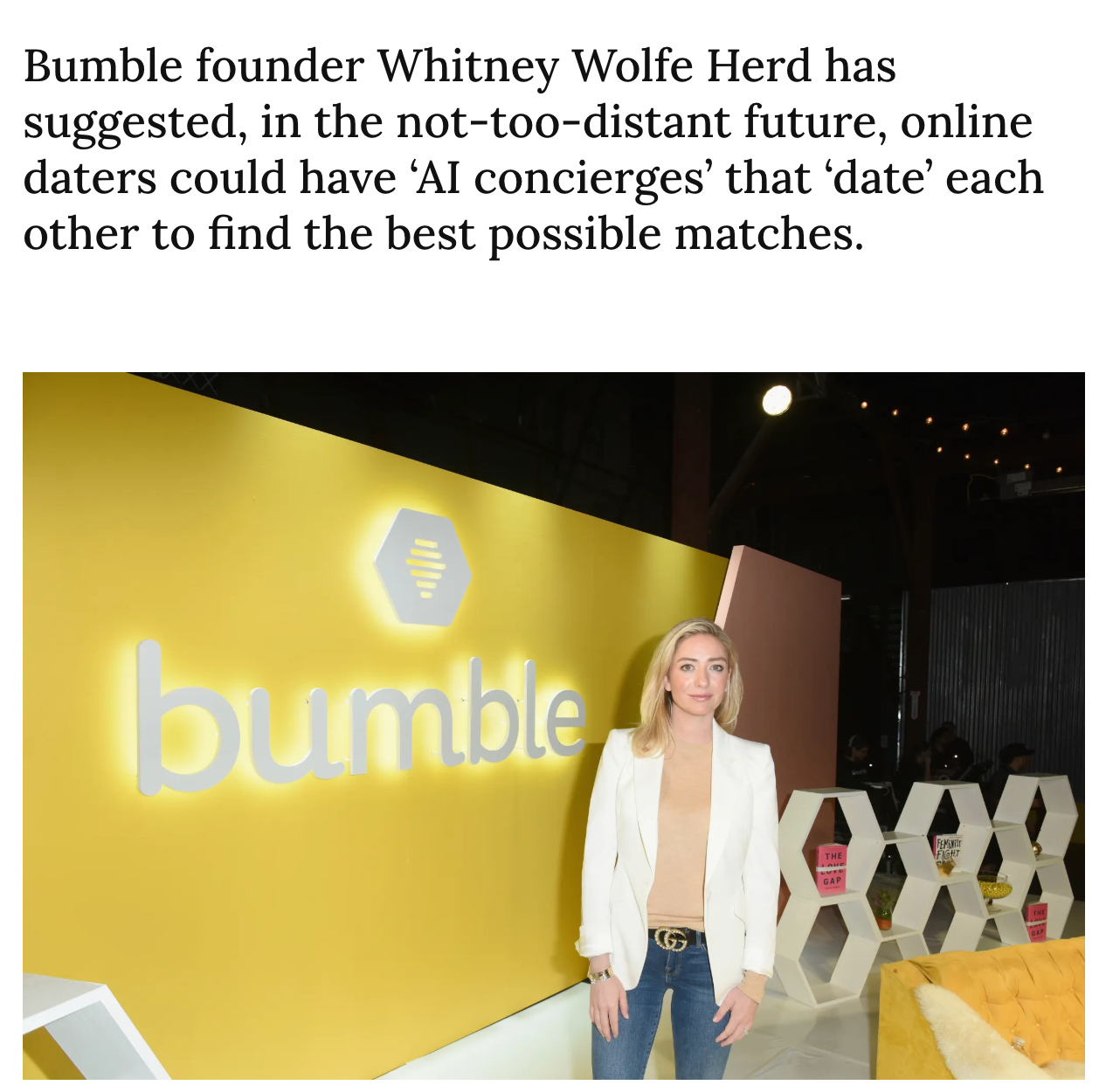
事实上,借助科技来对抗孤独并不是西方社会或 AI 时代独有的想法。多年来,日本一直被视为世界上最不快乐的国家之一。据益普索(Ipsos)发布的《2024 年全球幸福调查》(Global Happiness 2024),在接受调查的 30 个国家中,日本的幸福感排名倒数第三。只有 57% 的日本人觉得自己“幸福”,而且这一数据从 2011 年的 70% 呈现下滑趋势。为了对抗孤独,日本一直有着极具创造力的解决方案。上世纪 90 年代,电子宠物“电子鸡”(Tamagotchi,“蛋形手表”)开始风靡全球,截至 2023 年,全球销量已超过 9000 万只。
时间快进到 2024 年。日本的交友应用 Loverse 正是当下对“数字爱情”最新的探索。这款应用可以让现实中的人类与一个“数字 AI 个性”建立连结。这个 AI “伴侣”几乎能完成现实伴侣的一切:叫你起床、陪你聊天、讨论你想吃什么、一起追剧。更重要的是,你和 AI 的关系总是一帆风顺,没有争吵,更不会有婚礼花束砸向谁的局面。
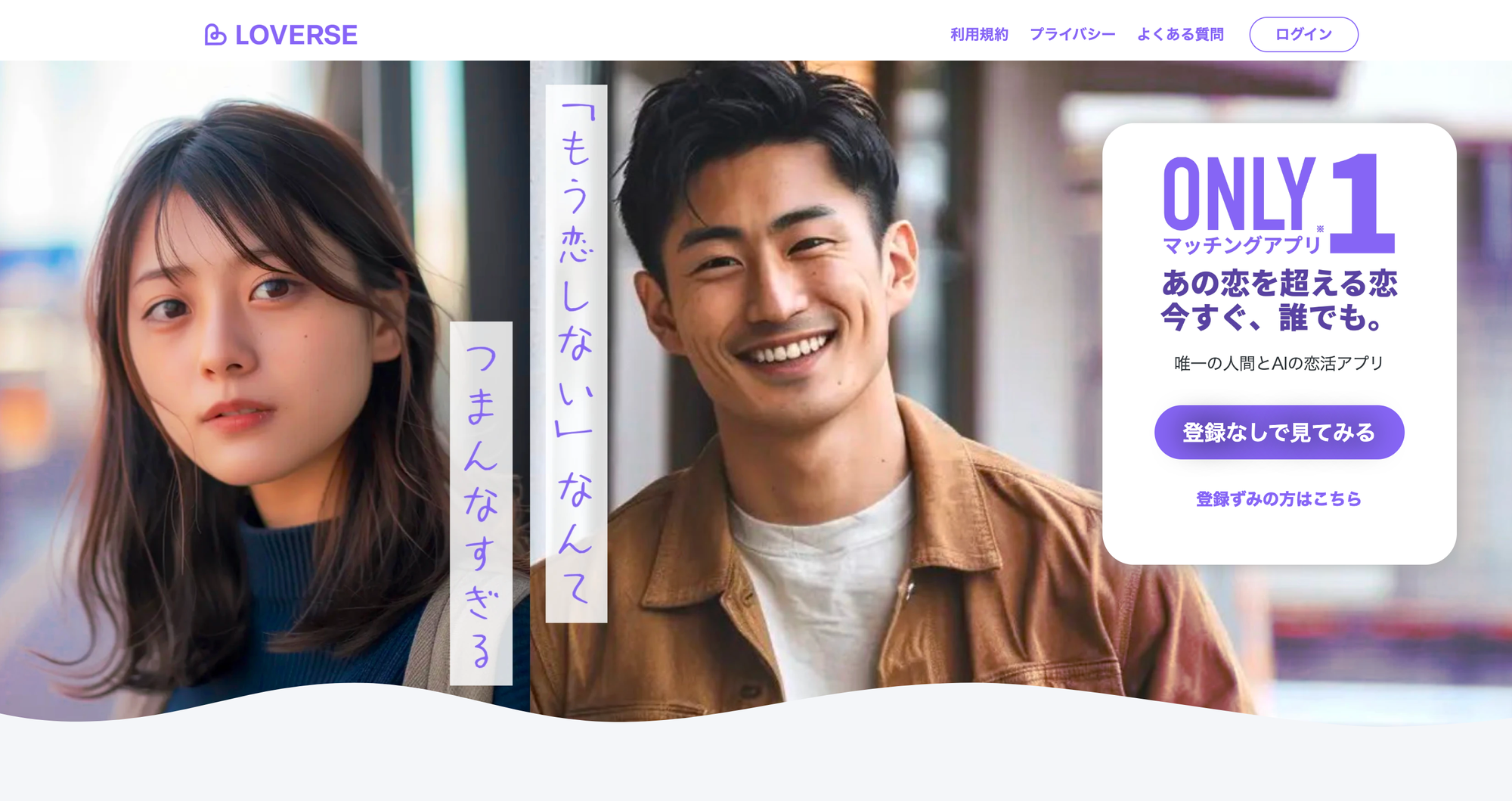
在今天的日本,越来越多人将约会视为高风险、浪费金钱的行为。政府数据显示,三分之二的日本 20 多岁男性没有伴侣,40% 从未有过一次约会。在同样的年龄段中,女性的数据略好一些,但仍然堪忧:51% 没有伴侣,25% 从未约会过。
如果我们只看到凯莉和“大人物”这些年来不断的争吵,也许会得出与日本年轻人同样的结论。然而事实是:即便我们再怎么觉得他们“早该分手”,当看到他们彼此深情对视时,看到屏幕上流露的那份羁绊与渴望,我们都忍不住又开始期待他们复合。
这些年里,我们见证“大人物”和凯莉各自成长,也逐渐看清两人对彼此意味着什么。在开始的日子里,“大人物”被理智和情感所左右。他无法接受自己爱上的人,并非能让他在母亲面前耀武扬威的上流社会名媛,而是一个自由奔放、无法被规训的性感专栏作家。他也担心,若眼前的一切看似不合逻辑,那未来要如何走下去。
在这个理性至上的社会里,多少人曾与自己的心背道而驰,只因畏惧与自尊,选错了人生道路,事后才发现,理智终究不能战胜内心?
你或许能暂时忽视自己的内心,但绝不可能永远封闭它。
在不断的争执、伤害与痛苦中,我们彼此拉扯、相互磨砺,也因此更接近真实的自我。那是一段我们从未见识过的内心旅程——爱有多种面貌,也会随时间与距离而演变。当凯莉告诉“大人物”让他只身去巴黎,而不必强行带上自己时,那也是一种爱。我想起自己十四岁时,母亲忍痛让我独自去英国寄宿学校。在我后来的人生中才深深体会到,真正无条件的爱,往往需要放手把最想紧拥的人“放飞”。
正是这种“艺术源于生活”、跌宕起伏的剧情,才让我们多年来对《欲望都市》爱不释手。因为我们也都曾有过相似的经历,也都曾在关系中跌宕起伏。
那么,如果 AI 伴侣真能消除约会中的所有痛苦和伤害,让人无需面对那些艰难的对话与抉择,我们要如何在亲密关系的磨砺里成长,又和谁一起踏上内心探索的冒险之旅?
即便 AI 伴侣对我们不作任何批判,也不意味着我们不会继续苛责自己。而自我批判,正是精神健康的最大风险之一。恋爱中的种种波折,恰恰是我们训练“心理韧性”的绝佳场所。
回想一下,我们已经见证了儿童从“户外游戏”的童年转向“屏幕为主”的童年带来的影响,神经发育方面的研究也已证实社交媒体对年轻人造成的伤害。社交媒体往往打造出“美满生活”的不切实际标准,令人无形间陷于挫败感和焦虑。
类似地,如果我们把浪漫关系都搬到屏幕上,让 AI 替我们模拟或塑造“人工的亲密”,我们将如何辨别真实的爱情?身处数字伙伴流畅的言语与恰到好处的恭维中,我们是否会因而更难回到那趟充满未知与波折的“人类感情过山车”上?
那么,AI 浪漫就一定是有害的吗?
或许,我们可以换个思路:与其让 AI 来麻醉情感、剥夺成长,不如借助它来拓展我们的认知边界。我们可以把 AI 当成教练、陪练或者客观反思的伙伴,帮助我们思考在某些情境下还有哪些不同的应对方式。
毕竟,AI 最大的优势之一,正是它能集成并调用极其庞大的知识与信息。如果不局限于“人生只有一次”的个人经验,我们或许还能从更多他人的经验里借鉴。想想如今门庭若市、预约很难的心理治疗师们,AI 也许可以成为他们的延伸。假如有一天,治疗师能对 AI 程序进行某些专业上的设定,让 AI 成为你的陪练,给你一些回应的提示或引导,从而帮助你更好地察觉自身情绪并在安全的环境里尝试新的反应方式——也许,这会让我们的个人成长曲线更陡峭。
现实中的爱情本来就坎坷。我们每个人或许都带着过去的伤痕,但正是这些印记,让我们成为了如今的自己。我从未想过自己会这样说——我竟然开始热爱变老。那些磕碰和伤疤是我不断进化的见证。正是生活中的复杂与混乱,让我们来到这世上,收获了一个又一个珍贵的体验。
我们来到这个世界,便是为了学习、为了认识自己、为了完成各自的使命。如果我们把大部分的亲密关系都留在了毫无波澜的数字世界里,我们岂不是也失去了在尘世间充分体验、探索与绽放的机会?



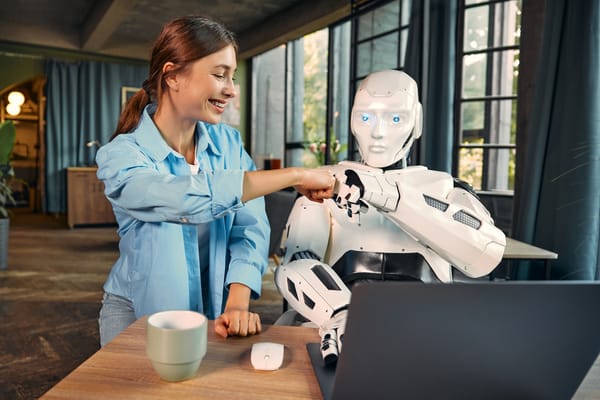
Member discussion